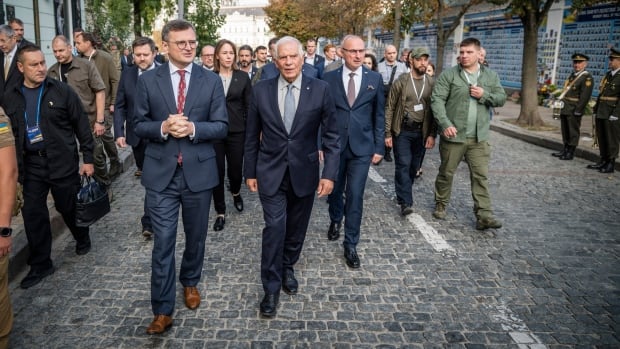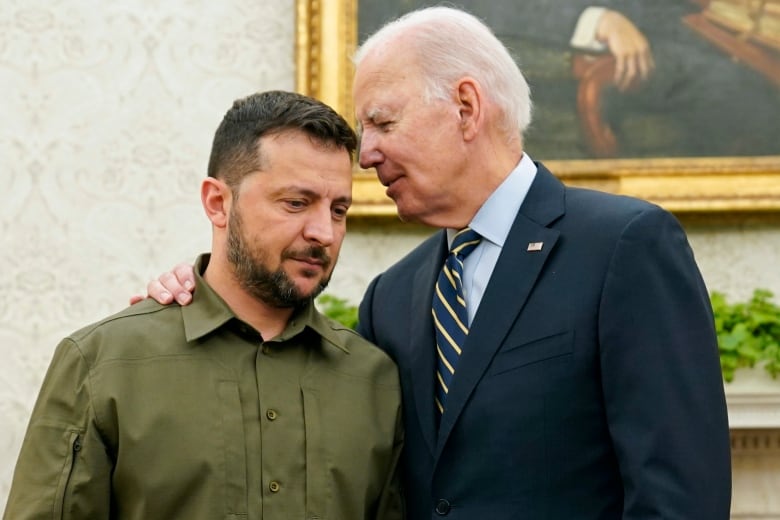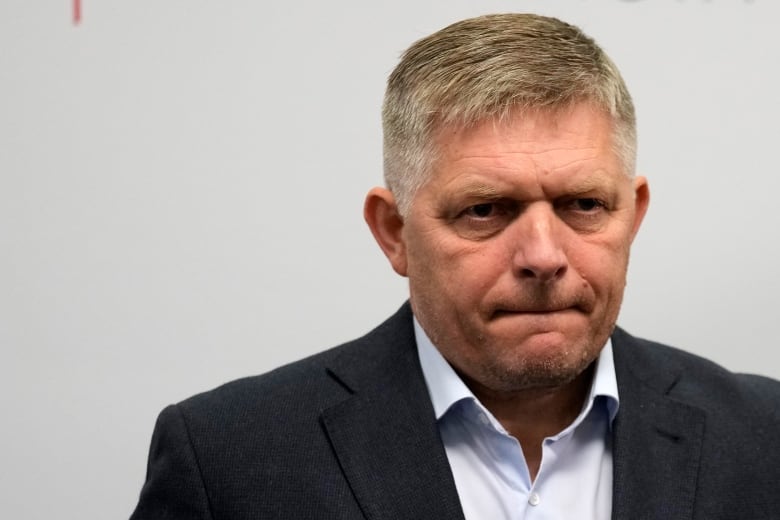
EU foreign ministers convened in Kyiv for their first ever meeting outside the bloc on Monday, broadcasting their support after a pro-Russian candidate won an election in Slovakia and the U.S. Congress left Ukraine war aid out of its spending bill.
Kyiv brushed off the wobbles on both sides of the Atlantic, especially the prospect that the U.S. congressional vote, which excluded aid to Ukraine from an emergency bill to prevent a government shutdown, represented a deeper change in policy.
“We don’t feel that the U.S. support has been shattered … because the United States understands that what is at stake in Ukraine is much bigger than just Ukraine,” Foreign Minister Dmytro Kuleba told reporters as he greeted the EU foreign policy chief, Josep Borrell.
As for the election victory of pro-Russian Slovakian former prime minister Robert Fico, Kuleba said it was “too early to judge” the impact on politics there, noting that a new leader would still have to form a coalition.
An awkward time
Monday’s meeting in Kyiv was touted by Borrell as a historic first, and provided striking photo opportunities for a succession of ministers in front of EU flags in the war-time capital.
He told a news briefing with Kuleba the EU remained united in its support for Ukraine and that he had proposed an EU spending package for Kyiv of up to $7.18 billion Cdn for 2024, for which he hoped to have agreement by then.
Kuleba said it would help both Ukraine and the EU to have more clarity on the judicial aspects of transferring Russian assets frozen in the West to help fund Ukraine’s reconstruction efforts.
“I am sure that Ukraine and the entire free world are capable of winning this confrontation. But our victory depends directly on our co-operation with you,” Ukraine’s President Volodymyr Zelenskyy told the ministers, according to his website.
The United States, the EU and the United Kingdom have provided massive military and financial support to Ukraine, enabling it to stand up to the Kremlin’s attack. The assistance is crucial for Ukraine’s weakened economy and has so far been open-ended.
But the meeting comes at an awkward time. The summer is coming to a close after a slower-than-expected Ukrainian military counter-offensive, without the major success that Western leaders had hoped to see before autumn mud clogs the treads of their donated tanks.

Writing on Telegram, Ukrainian parliament member Oleksiy Goncharenko said Sunday that Kyiv needed to adopt new measures to ensure the continued support of both American officials and the general public. Without it, Goncharenko said, Ukrainians have “practically no chance” of defending themselves.
He set forward a list of proposals that included permanently posting Ukrainian delegates in Washington.
“We need to speak the language of money with the U.S.: How will the United States benefit from Ukraine’s victory? What will the U.S. get? What will American taxpayers get?” Goncharenko wrote. “We need to change strategy. We need to act differently. Let’s fix this situation. We cannot lose.”
Moscow says West will tire of war
Moscow touted the congressional vote in the United States as a sign of increasing division in the West, although the Kremlin said it expected Washington to continue its support for Kyiv.
The vote omitting aid was “a temporary phenomenon. America will continue its involvement in this conflict, in fact direct involvement,” Kremlin spokesperson Dmitry Peskov said.
“But we have repeatedly said before that according to our forecasts, fatigue from this conflict, fatigue from the completely absurd sponsorship of the Kyiv regime, will grow in various countries, including the United States.”
Elections are looming in several Western countries, above all next year in the United States where former president Donald Trump is leading the Republican field in his bid to return to the White House. Several high-profile, right-wing Trump supporters in Congress have called for a halt to Ukraine aid.
Republicans already control the House of Representatives, one of the two houses of the U.S. Congress. Although most Republican lawmakers still support Kyiv, House Speaker Kevin McCarthy was forced to rely on Democrats to pass the weekend measure to keep the government open, and might need to rely on them again to support any bill to fund Ukraine. Right-wingers have threatened to try to remove him.
President Joe Biden’s administration says it expects the House to pass a measure to keep aid to Ukraine flowing. Biden on Sunday pressed congressional Republicans to back the aid, saying he was “sick and tired” of the political brinkmanship that had nearly shut the government.
Kuleba said Ukraine had “a very in-depth discussion with both parts of the Congress — Republicans and Democrats,” and expects aid to continue.
Slovakian election winner wants no ammo sent to Ukraine
In Europe, pro-Russian former prime minister Fico won the most votes in Slovakia’s election on the weekend and will get a first chance to form a government. His campaign had called for “not a single round” of ammunition from Slovakia’s reserves to be sent to Ukraine.
“We are not changing that we are prepared to help Ukraine in a humanitarian way,” Fico said at a news conference after his victory. “We are prepared to help with the reconstruction of the state, but you know our opinion on arming Ukraine.”
Fico was given two weeks to form a government. To do so, he would have to establish a coalition with at least one other party that does not publicly share his position on Ukraine.

Russia’s Peskov defended Fico, saying it was “absurd” that politicians who support their country’s national interest were labelled “pro-Russian.”
Slovakia, a NATO state with a small border with Ukraine, has taken in refugees and, under the outgoing government, has provided a disproportionately major supply of weapons, notably being among the first to send fighter jets.
Luxembourg Foreign Minister Jean Asselborn said Western allies must keep up the military aid “because if we don’t deliver any weapons from the EU, from NATO, from other countries, then this war is over but with the wrong consequences.”
Meanwhile, Ukraine’s presidential office said Monday that over the previous 24 hours at least five civilians were killed and 13 people were hurt. Most of them in the east of the Donetsk region.
Russian attacks on residential areas of 11 cities and villages there killed three and wounded five people, it said.
The claims could not be independently verified.